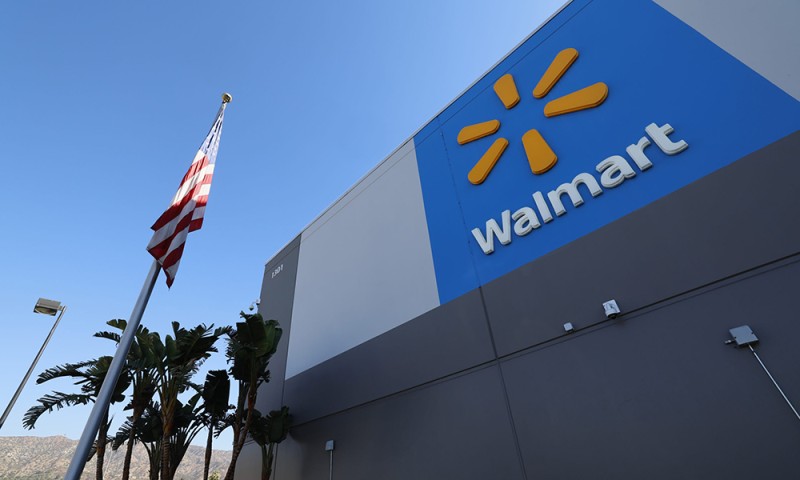
• 作为沃尔玛(Walmart)财富的继承人,卢卡斯·沃尔顿已将其150亿美元财富悄然投入Builders Vision。这家总部位于芝加哥的机构致力于通过在清洁能源、食品和农业领域的可持续投资,产生环境和社会影响力。沃尔顿素来行事低调,他坚信需要借助商界的力量来推动可扩展的变革,并坚持认为有影响力的项目能够带来与传统投资相媲美的财务回报。
在当今的经济环境下,亿万富翁的工作、观点和争斗往往难以回避,然而,《财富》美国500强榜首企业背后的家族却倾向于避开聚光灯。
沃尔玛帝国创始家族——沃尔顿家族的成员,偶尔会低调地分享他们对政治或经济前景的看法,然后便回归工作。
而这正是卢卡斯·沃尔顿所希望的状态。身家390亿美元(财富源于其祖父山姆·沃尔顿创立的商业帝国)的卢卡斯·沃尔顿,于2017年创立了Builders Vision,作为其慈善、投资和倡导工作的统筹平台。
这家总部位于芝加哥的公司核心任务是:部署资本、倡导变革,并在清洁能源、食品与农业以及海洋保护等一系列事业中更广泛地支持合作伙伴。
沃尔顿此前拒绝了所有媒体采访,但他在近日首次接受《金融时报》的采访时表示,做出这一决定是为了防止人们“带着先入为主的假设”来评判他。
沃尔顿将时间和资金投入了环保事业。他对《金融时报》表示,他已将150亿美元自有资金投入Builders Vision——旨在为那些兼具财务回报和社会效益的事业提供资金支持。
现年39岁的沃尔顿正与其他亿万富翁慈善家一道,更加专注于打造一个更可持续、更平等的世界。
例如,今年早些时候,微软(Microsoft)联合创始人比尔·盖茨确认了现代史上最大的一笔个人慈善捐赠。他宣布将把绝大部分财富——约2,000亿美元——赠予盖茨基金会(Gates Foundation),并在未来二十年内支出使用。
尽管沃尔顿的动机很明确——他希望世界变得更加“人道和健康”——但他本人也亲身体验过获得良好营养带来的益处。
沃尔顿在学龄前被诊断出患有一种罕见的癌症。据沃尔顿家族称,他的痊愈部分归功于母亲给他食用的全天然饮食。
沃尔顿表示,他“时刻谨记”自己能活下来是多么幸运,并补充道:“父母教会了我那些让我得以生存至今的好习惯。我母亲基本上是用自家菜园的食材将我喂养大,这让我明白了我们的食物从何而来。”
这位科罗拉多学院(Colorado College)的毕业生继续说道:“从食品和农业入手,我希望让我的资金发挥作用,而且我看到创新的灵活资本有其施展的空间。”
“我的直觉一直告诉我,要借助商界的力量,因为它规模庞大、体量惊人。”
并非慈善
沃尔顿信念的核心在于:投资者(实际上包括与他一样的高净值人士)将资金充分投入到具有社会或环境效益的项目中,需要看到回报。
因此,他对《金融时报》表示,他的项目不应被定性为慈善事业,因为它们非常明确地追求匹配甚至超越其他市场领域的回报。
沃尔顿已经着手开展了一些他认为能证明有回报潜力的重大项目,例如在内布拉斯加州投资一家购买农田然后出租用于有机农业的企业。
要让绿色经济成为比传统市场更具吸引力的投资对象,这绝非易事。但作为Builders Vision首席执行官的沃尔顿坚持认为:“机遇是存在的。”
“(融资缺口)并非缺乏项目所致。但人们首先需要认识到,环境关乎工业,涉及基础设施,是金融产品,而不仅仅是树木。”
沃尔顿在彭博亿万富豪指数(Bloomberg’s Billionaires Index)上排名第37位。他似乎乐于以自己的方式继续他的事业。人们经常看到他在芝加哥骑自行车上班,他驾驶的是一辆沃尔沃(Volvo)SUV,而非其他富豪青睐的顶级豪车。
他远离聚光灯的作风也延伸到了他的爱好上。他说,越野骑行的宁静让他着迷,因为“那是少数几个我无法接电话的场合之一”。(*)
译者:刘进龙
审校:汪皓
• 作为沃尔玛(Walmart)财富的继承人,卢卡斯·沃尔顿已将其150亿美元财富悄然投入Builders Vision。这家总部位于芝加哥的机构致力于通过在清洁能源、食品和农业领域的可持续投资,产生环境和社会影响力。沃尔顿素来行事低调,他坚信需要借助商界的力量来推动可扩展的变革,并坚持认为有影响力的项目能够带来与传统投资相媲美的财务回报。
在当今的经济环境下,亿万富翁的工作、观点和争斗往往难以回避,然而,《财富》美国500强榜首企业背后的家族却倾向于避开聚光灯。
沃尔玛帝国创始家族——沃尔顿家族的成员,偶尔会低调地分享他们对政治或经济前景的看法,然后便回归工作。
而这正是卢卡斯·沃尔顿所希望的状态。身家390亿美元(财富源于其祖父山姆·沃尔顿创立的商业帝国)的卢卡斯·沃尔顿,于2017年创立了Builders Vision,作为其慈善、投资和倡导工作的统筹平台。
这家总部位于芝加哥的公司核心任务是:部署资本、倡导变革,并在清洁能源、食品与农业以及海洋保护等一系列事业中更广泛地支持合作伙伴。
沃尔顿此前拒绝了所有媒体采访,但他在近日首次接受《金融时报》的采访时表示,做出这一决定是为了防止人们“带着先入为主的假设”来评判他。
沃尔顿将时间和资金投入了环保事业。他对《金融时报》表示,他已将150亿美元自有资金投入Builders Vision——旨在为那些兼具财务回报和社会效益的事业提供资金支持。
现年39岁的沃尔顿正与其他亿万富翁慈善家一道,更加专注于打造一个更可持续、更平等的世界。
例如,今年早些时候,微软(Microsoft)联合创始人比尔·盖茨确认了现代史上最大的一笔个人慈善捐赠。他宣布将把绝大部分财富——约2,000亿美元——赠予盖茨基金会(Gates Foundation),并在未来二十年内支出使用。
尽管沃尔顿的动机很明确——他希望世界变得更加“人道和健康”——但他本人也亲身体验过获得良好营养带来的益处。
沃尔顿在学龄前被诊断出患有一种罕见的癌症。据沃尔顿家族称,他的痊愈部分归功于母亲给他食用的全天然饮食。
沃尔顿表示,他“时刻谨记”自己能活下来是多么幸运,并补充道:“父母教会了我那些让我得以生存至今的好习惯。我母亲基本上是用自家菜园的食材将我喂养大,这让我明白了我们的食物从何而来。”
这位科罗拉多学院(Colorado College)的毕业生继续说道:“从食品和农业入手,我希望让我的资金发挥作用,而且我看到创新的灵活资本有其施展的空间。”
“我的直觉一直告诉我,要借助商界的力量,因为它规模庞大、体量惊人。”
并非慈善
沃尔顿信念的核心在于:投资者(实际上包括与他一样的高净值人士)将资金充分投入到具有社会或环境效益的项目中,需要看到回报。
因此,他对《金融时报》表示,他的项目不应被定性为慈善事业,因为它们非常明确地追求匹配甚至超越其他市场领域的回报。
沃尔顿已经着手开展了一些他认为能证明有回报潜力的重大项目,例如在内布拉斯加州投资一家购买农田然后出租用于有机农业的企业。
要让绿色经济成为比传统市场更具吸引力的投资对象,这绝非易事。但作为Builders Vision首席执行官的沃尔顿坚持认为:“机遇是存在的。”
“(融资缺口)并非缺乏项目所致。但人们首先需要认识到,环境关乎工业,涉及基础设施,是金融产品,而不仅仅是树木。”
沃尔顿在彭博亿万富豪指数(Bloomberg’s Billionaires Index)上排名第37位。他似乎乐于以自己的方式继续他的事业。人们经常看到他在芝加哥骑自行车上班,他驾驶的是一辆沃尔沃(Volvo)SUV,而非其他富豪青睐的顶级豪车。
他远离聚光灯的作风也延伸到了他的爱好上。他说,越野骑行的宁静让他着迷,因为“那是少数几个我无法接电话的场合之一”。(*)
译者:刘进龙
审校:汪皓
• Lukas Walton, an heir to the Walmart fortune, has quietly invested $15 billion of his wealth into Builders Vision, a Chicago-based organization focused on environmental and societal impact through sustainable investments in clean energy, food, and agriculture. Preferring to stay out of the spotlight, Walton believes in engaging the business community for scalable change and insists that impactful projects can deliver financial returns comparable to traditional investments.
In the current economy, the work, opinions and battles of billionaires can be hard to avoid—yet the dynasty behind the leading business in the Fortune 500 tends to stay out of the spotlight.
Every now and again members of the Walton family, whose relatives began the Walmart empire, will quietly share their thoughts on the political or economic outlook before returning to their work.
And that’s precisely how Lukas Walton has wanted it to be. The man worth $39 billion courtesy of the business founded by his grandfather, Sam Walton, established Builders Vision in 2017 as an umbrella for his philanthropic, investment, and advocacy work.
The focus of the Chicago-based company is to deploy capital, advocate for change, and support partners more widely in a range of endeavors across clean energy, food and agriculture, and ocean preservation.
Walton had declined all media interviews, but spoke to the Financial Times for the first time in an interview published today, saying he had made the decision to prevent people “leading with their assumptions” about him.
Instead Walton has directed his time and funds towards environmental efforts and told the FT he had plowed $15 billion of his own funds into Builders Vision—to bankroll endeavors that come with both financial and societal returns.
Walton, 39, is adding his voice to a wider push from other billionaire philanthropists for a greater focus on a more sustainable and equal planet.
Earlier this year, for example, Microsoft co-founder Bill Gates confirmed the largest philanthropic donation from an individual in modern history. He announced the Gates Foundation will receive the vast majority of his wealth—approximately $200 billion—to be spent within the next two decades.
While Walton’s motives are clear—he wants the world to be more “humane and healthy”—he has experienced first-hand the benefits that access to good nutrition can bring.
As a preschooler Walton was diagnosed with a rare form of cancer and, according to the Walton family, was cured in part thanks to his mother feeding him an all-natural diet.
Walton said he is “constantly reminded” of how lucky he is to be alive, and added: “My parents taught me the good habits that have kept me around. My mom basically raised me out of her garden, and that way I got to learn where our food comes from.”
The Colorado College graduate continued: “Starting with food and agriculture, I want to put my money to work and I saw there was a space for innovative, flexible capital.
“My gut feeling all along has been to engage the business community because of its size and scale.”
Not charity
Fundamental to Walton’s belief is that investors—and indeed his high net worth peers—need to see returns if they are going to fully engage their capital in projects which have societal or environmental benefits.
As such, he told the FT, his projects should not be framed as charitable because they have a very clear focus on returns that either match or outperform the rest of the market.
Walton has already undertaken significant projects which he says demonstrate returns, for example backing a business in Nebraska that purchases and then leases farmland for organic agriculture.
Making the green economy a more palatable investment than markets is certainly no small undertaking, but Walton, the CEO of Builders Vision, maintains: “The opportunities are out there.
“[The finance gap] is not for lack of pipeline. But people first need to realize that the environment is industry, it’s infrastructure, it’s financial products, it’s not simply trees.”
It seems Walton—ranked 37th on Bloomberg’s Billionaires Index—is happy to get on with the job in his own way. He’s often spotted cycling to the office in Chicago, and drives a Volvo SUV instead of the higher-end luxury vehicles preferred by other billionaires.
His urge to stay out of the limelight extends to his hobbies. The quiet of trail biking, he says, is a draw because “it’s one of those places I can’t be on a phone call.”

